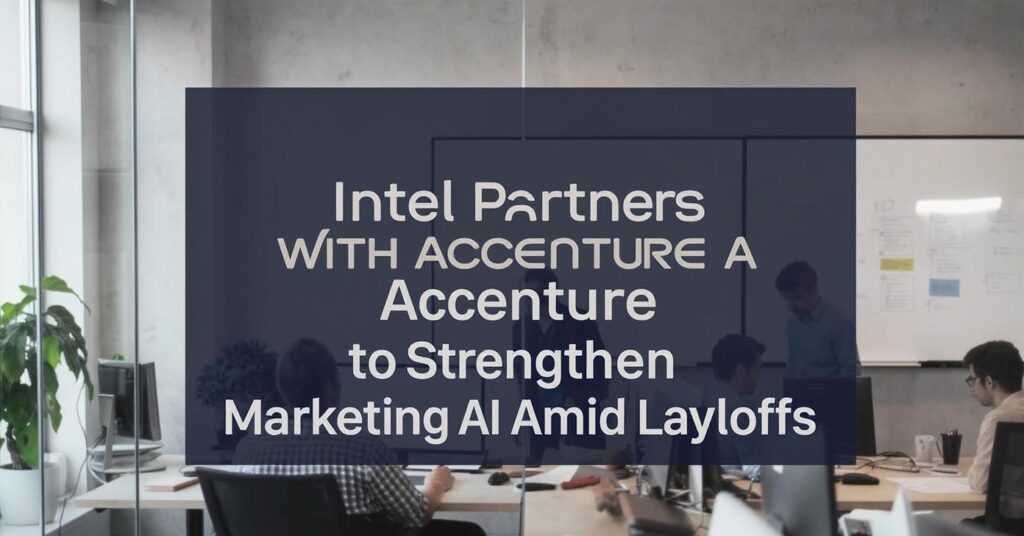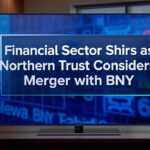In a bold strategic shift that mirrors broader industry trends, Intel taps Accenture, AI for marketing as workforce shrinks, signaling a transformative phase in its operational and marketing strategy. As the global semiconductor leader tightens resources and manages workforce reductions, it is simultaneously doubling down on digital innovation—especially AI-driven marketing—to navigate market headwinds and maintain competitive edge.
Intel’s collaboration with Accenture and its integration of advanced AI tools come at a time when the company is aggressively optimizing costs and recalibrating its internal structure. With mounting pressure to adapt to a rapidly evolving technological landscape, Intel’s move underscores a broader corporate pivot across the B2B space: leveraging automation, artificial intelligence, and external expertise to achieve agility and scalability.
Strategic Shift: Embracing AI for Competitive Marketing
As Intel taps Accenture, AI for marketing as workforce shrinks, the company is strategically realigning its marketing model. By leveraging AI technologies, Intel aims to enhance customer segmentation, personalize outreach, and generate data-driven insights that can drive better ROI.
This AI integration supports Intel’s vision of modern, adaptive marketing campaigns that are not only cost-efficient but also highly targeted. The shrinking of the workforce is not just about reducing overhead—it’s about transforming legacy processes and making room for smarter, automated systems.
In a recent statement, Intel highlighted its investment in next-gen marketing solutions that deliver customer intelligence, campaign automation, and dynamic content strategies. These technologies enable Intel to reduce manual workloads while scaling operations across multiple global markets.
Accenture’s Role in Intel’s Modernization Journey
Intel’s collaboration with Accenture is integral to this transformation. As a world-leading consulting and digital services firm, Accenture brings a depth of experience in managing digital transitions for Fortune 500 companies.
When Intel taps Accenture, AI for marketing as workforce shrinks, it’s not just outsourcing; it’s strategic co-creation. Accenture provides Intel with access to its SynOps platform and proprietary AI tools, allowing Intel’s marketing teams to access real-time analytics, predictive modeling, and campaign performance metrics.
This partnership has been structured to support Intel’s strategic focus on agility, data precision, and market responsiveness—essential traits in an industry where product cycles and consumer expectations evolve rapidly. The goal is to shift Intel’s marketing from a traditional, reactive model to a more proactive and AI-enabled ecosystem.
Workforce Shrinkage: A Cost Optimization Strategy
Intel’s workforce reduction is part of a wider cost-saving initiative, with thousands of roles across non-core functions being phased out or restructured. While such moves often generate concern internally, Intel maintains that this is not about downsizing innovation—it’s about reallocating resources for greater business efficiency.
The decision to shrink the workforce aligns with Intel’s broader fiscal prudence, especially as the company navigates reduced margins and increased competition from rivals like AMD and Nvidia. It’s also reflective of the industry-wide shift toward leaner operational models supported by AI and automation.
By offloading some functions to partners like Accenture and enabling AI systems to handle repetitive tasks, Intel can repurpose its remaining workforce for higher-value activities, such as strategic planning, product development, and customer experience innovation.
AI Marketing Capabilities Driving Revenue Efficiency
The integration of AI into Intel’s marketing stack is already yielding promising outcomes. AI models trained on customer data help Intel understand behavior patterns, preferences, and purchase intent across multiple verticals—from consumer electronics to B2B cloud solutions.
This insight helps Intel deploy more effective messaging strategies, tailored promotions, and account-based marketing initiatives. AI also automates reporting, enabling real-time campaign optimization and predictive lead scoring, which significantly enhances pipeline conversion.
As Intel taps Accenture, AI for marketing as workforce shrinks, the company is establishing a replicable framework that aligns with best practices in digital marketing transformation—one where AI assists human creativity and drives outcomes faster and more efficiently than legacy systems ever could.
Intel’s Larger Digital Transformation Framework
The pivot to AI and external partnerships is just one piece of Intel’s larger digital transformation agenda. The company is undergoing end-to-end modernization—from chip design and supply chain automation to digital twin simulations and predictive maintenance using AI.
This transformation is especially critical as Intel aims to reclaim market dominance and enhance profitability amidst a volatile macroeconomic environment. The integration of AI into marketing is a crucial lever within this blueprint, enabling Intel to interact with customers in more meaningful, measurable, and personalized ways.
Additionally, Intel’s focus on cloud-native platforms, edge computing, and generative AI research creates new opportunities for synergy between product innovation and marketing effectiveness.
B2B Marketing: Evolution Through Intelligence and Automation
The B2B marketing domain has traditionally lagged behind B2C in terms of personalization and digital automation. However, companies like Intel are setting a new precedent. By harnessing AI tools like customer journey analytics, intelligent content generation, and sentiment analysis, B2B marketing is becoming more predictive, scalable, and impactful.
When Intel taps Accenture, AI for marketing as workforce shrinks, the move showcases how even the largest technology manufacturers must adapt and evolve marketing strategies to keep pace with customer expectations and technological possibilities.
This trend reflects a growing consensus that intelligent automation is not merely a cost-cutting measure, but a value creation strategy that future-proofs enterprises against disruption.
Employee Redeployment and Skills Transition
As workforce changes unfold, Intel has confirmed efforts to retrain and upskill displaced employees, offering internal mobility programs and AI-literacy training. The company understands that AI adoption must be balanced with human capital development.
The reallocation of roles ensures that Intel retains institutional knowledge while equipping its workforce to thrive in new, tech-enabled functions. Accenture is also involved in shaping talent strategies, advising Intel on change management and digital fluency programs.
This underscores that workforce shrinkage does not equate to neglect; rather, it indicates a recalibration of roles in response to a changing digital economy.
Investor and Market Response to Intel’s Strategy
Intel’s announcement that it will restructure marketing operations and reduce headcount, while onboarding Accenture and AI technologies, received mixed market reactions initially. However, analysts now suggest that this is a long-term value-oriented approach.
Investors increasingly favor companies that exhibit operational discipline while demonstrating strategic investments in innovation. By aligning marketing with AI and leveraging outside expertise, Intel is enhancing both cost management and innovation velocity—an important balance in today’s hyper-competitive tech ecosystem.
Setting a Precedent for Enterprise Tech Leaders
The broader implications of Intel’s strategy are profound. As Intel taps Accenture, AI for marketing as workforce shrinks, other enterprise tech leaders may follow suit. Marketing is no longer about intuition and large teams; it’s about real-time data, precision targeting, and intelligent automation.
Intel’s model—leaner teams, smarter systems, and agile partners—could well become a template for others in the semiconductor and tech space, particularly those undergoing digital reinvention while facing labor and resource constraints.
A Glimpse into the Future of AI-Driven B2B Marketing
As this transition unfolds, it’s evident that Intel taps Accenture, AI for marketing as workforce shrinks not only to streamline its business but to reimagine how marketing can be done better, faster, and smarter.
Intel’s marketing team is now less focused on traditional campaign execution and more on strategy orchestration—leveraging real-time insights, co-innovating with Accenture, and continuously optimizing through AI platforms.
In a sector where market responsiveness and operational efficiency are paramount, this move may just position Intel to lead not only in semiconductors but in enterprise-grade marketing transformation as well.
Read Full Article : https://bizinfopro.com/news/hr-news/intel-taps-accenture-ai-for-marketing-as-workforce-shrinks/
About Us : BizInfoPro is a modern business publication designed to inform, inspire, and empower decision-makers, entrepreneurs, and forward-thinking professionals. With a focus on practical insights and in‑depth analysis, it explores the evolving landscape of global business—covering emerging markets, industry innovations, strategic growth opportunities, and actionable content that supports smarter decision‑making.



